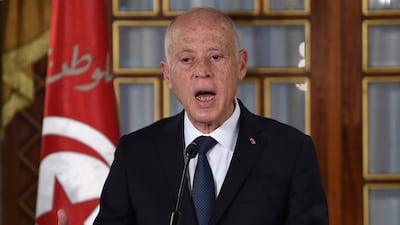Tunisian President Kais Saied says he will not interfere in the judiciary, a day after he announced he was dissolving the Supreme Judicial Council.
Speaking during a meeting with Prime Minister Najla Bouden late on Monday, Mr Saied said he took the decision to dissolve the council, one of the few remaining state bodies still able to act independently of him, because it "became a necessity", the presidency's page on Facebook said.
"I assure everyone in Tunisia and abroad that I will not interfere in the judiciary. I will not interfere in any case or any appointment. I do not want to control all power," Mr Saied said.
He accused judges of loyalty to political factions and cited cases that have languished in the courts for years without verdicts.
On Sunday, Tunisian judges rejected the move they see as undermining their independence, setting up a new struggle over his consolidation of power.
The US said it is deeply concerned by Mr Saied's move to dissolve the country's Supreme Judicial Council and the reported barring of employees from entering the institution, State Department spokesman Ned Price said on Monday.
In a regular press briefing in Washington, Mr Price told reporters Washington had called for an "accelerated political reform process" in Tunisia and urged the government to prioritise economic reforms to stabilise the country's financial situation.
Tunisia faces a crisis in public finances, posing a major challenge to any significant reform effort.
Mr Saied has held back on widespread arrests or efforts to shut down debate since last year, and has promised to uphold rights and freedoms won in the 2011 revolution that brought democracy.
However, security forces have pursued politicians and business leaders on various charges and pushed many of the cases through the military rather than civilian courts.
Mr Saied said he will rewrite the constitution and put it to a referendum this summer but critics say any changes should be decided through dialogue.
Mr Saied, whose wife is a judge, was a constitutional law professor before he ran for president in 2019.

